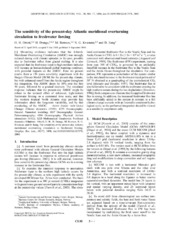The sensitivity of the present day Atlantic meriodinal overturning circulation to freshwater forcing
| dc.contributor.author | Otterå, Odd Helge | eng |
| dc.contributor.author | Drange, Helge | eng |
| dc.contributor.author | Bentsen, Mats | eng |
| dc.contributor.author | Kvamstø, Nils Gunnar | eng |
| dc.contributor.author | Jiang, Dabang | eng |
| dc.date.accessioned | 2005-09-22T08:25:32Z | |
| dc.date.available | 2005-09-22T08:25:32Z | |
| dc.date.issued | 2003-09-09 | eng |
| dc.Published | Geophysical Research Letters 2003 30(17): 1898 | en |
| dc.identifier.issn | 0094-8276 | en_US |
| dc.identifier.uri | https://hdl.handle.net/1956/804 | |
| dc.description.abstract | Mounting evidence indicates that the Atlantic Meridional Overturning Circulation (AMOC) was strongly reduced during cold climate episodes in the past, possible due to freshwater influx from glacial melting. It is also expected that the freshwater input to high northern latitudes will increase as human-induced global warming continues, with potential impacts on the AMOC. Here we present results from a 150 years sensitivity experiment with the Bergen Climate Model (BCM) for the present-day climate, but with enhanced runoff from the Arctic region throughout the integration. The AMOC drops by 30% over the first 50 years, followed by a gradual recovery. The simulated response indicates that the present-day AMOC might be robust to the isolated effect of enhanced, high-latitude freshwater forcing on a centennial time scale, and that the western tropical North Atlantic may provide key information about the long-term variability, and by that monitoring, of the AMOC. | en_US |
| dc.format.extent | 526579 bytes | eng |
| dc.format.mimetype | application/pdf | eng |
| dc.language.iso | eng | eng |
| dc.publisher | American Geophysical Union | en_US |
| dc.subject | Oceanography | eng |
| dc.subject | Climate dynamics | eng |
| dc.title | The sensitivity of the present day Atlantic meriodinal overturning circulation to freshwater forcing | en_US |
| dc.type | Peer reviewed | |
| dc.type | Journal article | |
| dc.identifier.doi | https://doi.org/10.1029/2003gl017578 |
Tilhørende fil(er)
Denne innførselen finnes i følgende samling(er)
-
Geophysical Institute [1186]
